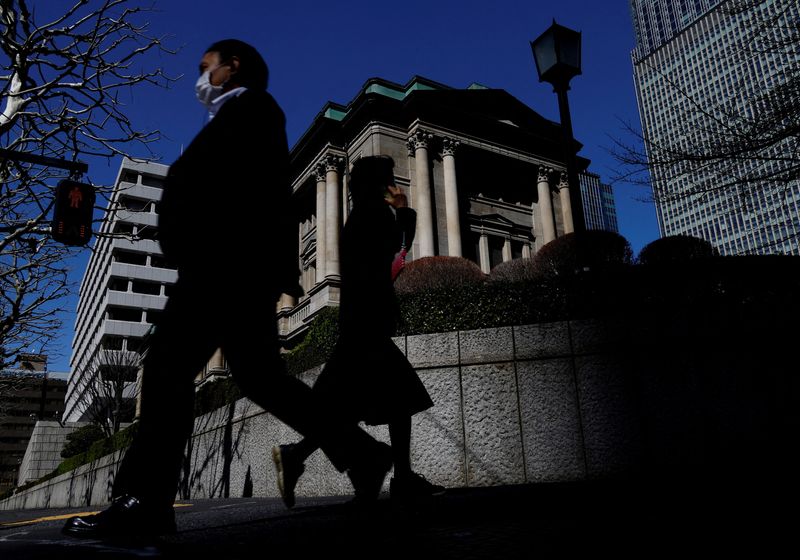By Leika Kihara
TOKYO (Reuters) -The Bank of Japan kept interest rates around zero on Friday and highlighted a growing conviction that inflation was on track to durably hit its target of 2% in coming years, signalling its readiness to hike borrowing costs later this year.
BOJ Governor Kazuo Ueda said the central bank would raise interest rates if fresh data back up its latest price forecasts or if inflation overshoots the projections.
But he offered few clues on when the next rate hike will come and ruled out shifting to a full-fledged reduction in the BOJ's bond purchases, underscoring its focus on keeping borrowing costs low even at the cost of accelerating yen falls.
The lack of clear guidance on the future rate hike path triggered a broad-based decline in the yen, pushing it down to a fresh 34-year low near 157 to the dollar and keeping markets on edge over a currency intervention.
"The currency takeaway is certainly disappointment from the lack of guidance from the bank," said Rodrigo Catril, senior FX strategist at National Australia Bank (OTC:NABZY) in Sydney.
"To me the currency market is telling us it believes that the BOJ policy is too loose and hence why the currency is so weak. The Bank has the ability to do something about that by changing its policy, and if it's not going to change the policy, then we shouldn't expect the yen to strengthen."
As widely expected, the BOJ maintained its short-term interest rate target at a range of 0-0.1%, which was set just a month ago when it made a historical exit from its massive stimulus programme and negative interest rates.
The central bank also stuck to its guidance in March about buying government bonds, dashing hopes by some traders that it could soon taper purchases partly to slow the yen's declines.
Governor Ueda said while the impact of yen moves was usually temporary, its effects on underlying inflation could not be dismissed, especially if it helps push up workers' wages.
"That's not to say we need to wait until the outcome of next year's wage talks become clear," Ueda said at a press briefing after the meeting. "If we can predict such an impact, we could change policy."
The yen briefly jumped against the dollar after Ueda's briefing ended, with traders on high alert for signs of intervention by Japanese monetary authorities. It was not immediately clear whether authorities actually stepped in.
ON TRACK
In a sign of its growing confidence in sustainably achieving its price target, the BOJ said in its quarterly outlook report that trend inflation was expected to pick up gradually as wages and prices rise in tandem.
"Underlying inflation is likely to be at a level that is generally consistent with our price target" around late 2025 through 2026, the report said.
In the quarterly outlook, the board projected core consumer inflation to hit 2.8% in the year that began in April, before slowing to 1.9% in fiscal 2025 and 2026.
The board expected the so-called "core core" index, which excludes the effect of fuel costs, to hit 1.9% in both fiscal 2024 and 2025, before accelerating to 2.1% in 2026.
The projections for "core core" inflation, which is closely watched by the BOJ as an indicator of the broader price trend, for 2024 and 2025 were unchanged from January.
"The forecast, very clearly in the upper 2% range, opens the way to future rate hikes given, of course, that the 'virtuous circle' stays intact," said Naomi Fink, global strategist at Nikko Asset Management.
"The key to the 'virtuous circle' remains positive real wages, and higher-than-expected inflation would challenge this virtuous circle. Only in the event inflation is eating into real wages, this is an argument for greater central bank hawkishness," she said.
For more analysts' views, click here.
YEN SLIDE
Recent threats of intervention by Japanese authorities have failed to arrest the yen's slide against the dollar to levels unseen since 1990, adding to headaches for policymakers worried about the hit to consumption from rising living costs.
Many traders believe there is not much Tokyo can fundamentally do to reverse the currency's slide with a persistently strong U.S dollar, interest rates and momentum heavily skewed against it.
Ueda has said the BOJ could lift rates further if it becomes confident wage gains will broaden and prod firms to hike service prices, thereby kicking off a cycle of wage and price rises.
Underscoring uncertainty over the price outlook, data released on Friday showed Tokyo core inflation, a leading indicator of nationwide figures, slowed much more than expected to slip below the BOJ's 2% target in April.
Economists polled by Reuters are divided on the timing of the BOJ's next hike, with some betting on action in the third quarter, while others project October-December or beyond.
While Ueda left scope to raise interest rates again, he made clear the BOJ had no immediate plan to drastically reduce its bond buying - even if doing so could slow the yen's declines.
In the statement issued on Friday, the BOJ removed explicit quantitative guidance issued at its March meeting to buy roughly 6 trillion yen ($38.42 billion) in government bonds per month.
But the central bank said it would keep buying bonds in accordance with the March guidance. Ueda said there was no opposition from the board for the BOJ to keep buying bonds at such a pace per month.
"We're still scrutinising how markets digest our March policy shift. If we were to reduce our bond buying in the future, we don't want to use it actively as a monetary policy means," Ueda said.
Under the current guidance, the BOJ's markets department has discretion to conduct bond buying operations so that monthly purchases move in a range of 5-7 trillion yen.
($1 = 156.1600 yen)
